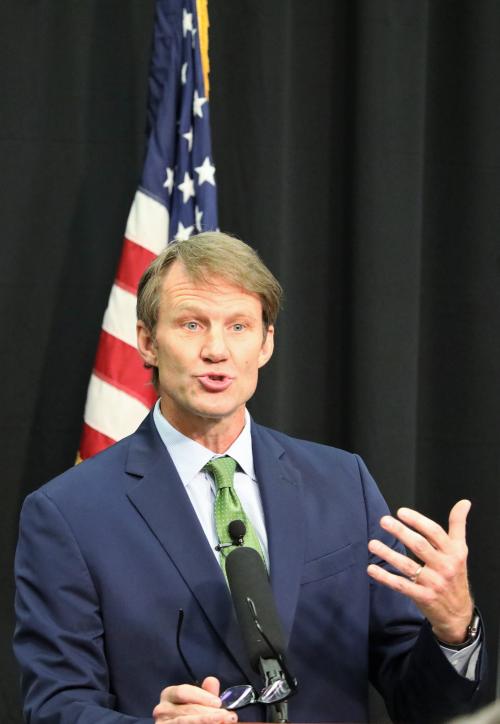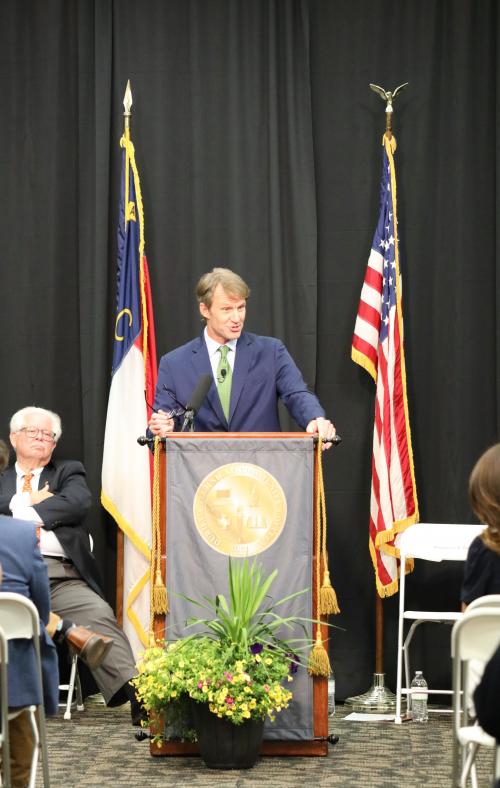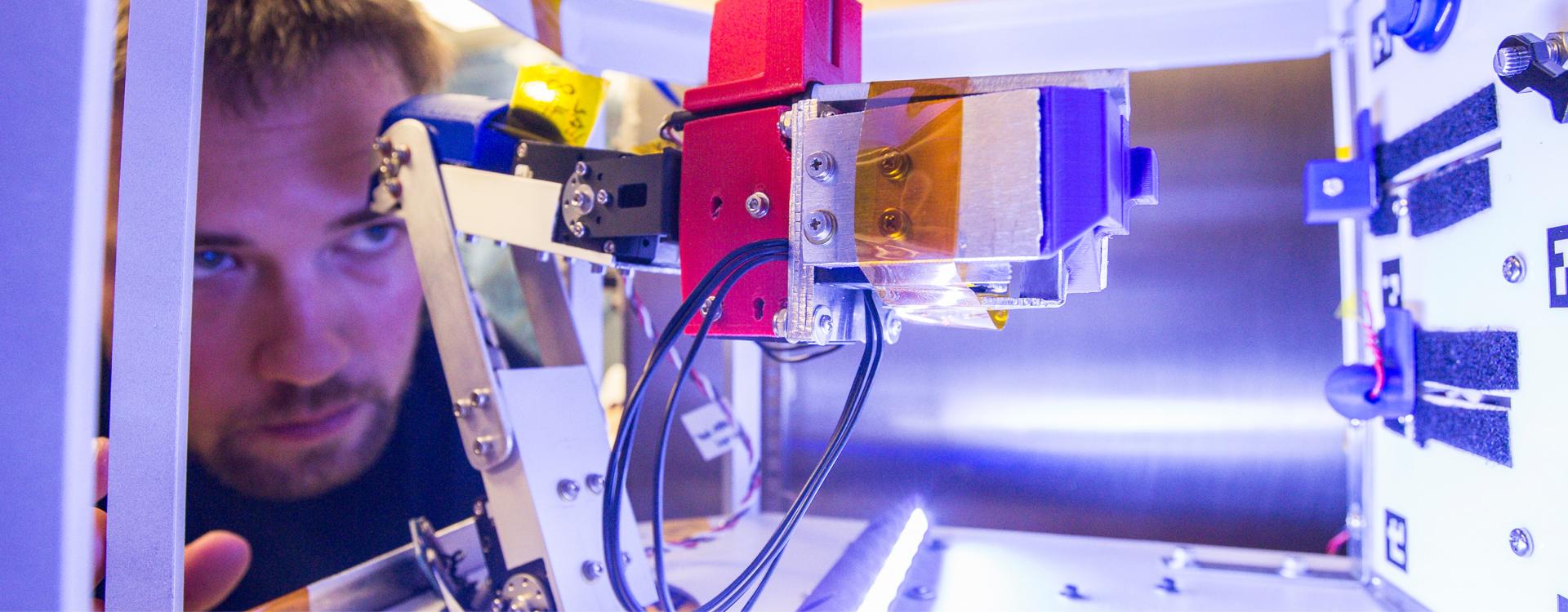Read President Buxton's Full Inauguration Remarks
"We come together today at moment freighted with possibility. It is a generational moment. A moment a region rich with opportunity and with need. It is a moment to ensure a broader social purchase on opportunity and success. To create in the words of Dr. King a “more beloved community.” And although we feel the pressure and excitement of it, this is not just Durham Tech’s moment - it is our collective moment.
At Durham Tech, we are proud of our legacy. We were born at another time when a shifting economy and search for broadened social opportunity called for a new type of educational approach. As Bill Ingram mentioned, this community stepped forward as one of the first six institutions in NC that would become the community college system. And since that time, we have worked hard to stay true to that legacy of access, innovation, and service to our students and community.
 But we are connected to a much older and larger vision of higher education that stretches back further than those 60 years. It is a vision that dates back to the chartering of the nation’s first state university just down the road in 1789; to the Morrill Act of 1862 and the creation of Land-Grant colleges; the Servicemen's Readjustment Act of 1944 known as the GI Bill; the beginnings of the NC community college system in 1957; and the Higher Education Act of 1965. It is a vision imbued with the belief in the transformative power of higher education and that the democratization of education ensures the broad provision of opportunity.
But we are connected to a much older and larger vision of higher education that stretches back further than those 60 years. It is a vision that dates back to the chartering of the nation’s first state university just down the road in 1789; to the Morrill Act of 1862 and the creation of Land-Grant colleges; the Servicemen's Readjustment Act of 1944 known as the GI Bill; the beginnings of the NC community college system in 1957; and the Higher Education Act of 1965. It is a vision imbued with the belief in the transformative power of higher education and that the democratization of education ensures the broad provision of opportunity.
Over time, this vision for higher education has created a kind of social contract. It is a contract between institutions like Durham Tech and its funders and between Durham Tech and its students. A contract through which our state and local governments appropriate resources to us and our students invest their resources with us in exchange for education and training that prepares residents for both continued education and jobs – and that preparation improves the quality of life in our communities. This contract has been durable tradition throughout our state’s history where, together with basketball, public education is a kind of civil religion.
But in 2021, the strength of this social contract has been brought into question. Persistent income inequality, rising levels of productivity without corresponding increases in wages, rates of college completion, and continued racial disparities in both education and life outcomes are challenging this tradition so long held. The worldwide pandemic of the last 16 months has had disproportionate impacts not just on health and economic standing, but on higher education where we have seen many of current and prospective students push pause on their educational aspirations.
In this moment of possibility, we all perceive, the question is being called: is the contract still valid?
A few weeks back, at our commencement exercises, I told the stories of three individuals who are emblematic of the students who come to Durham Tech to shape and propel their futures.
I talked about Hailey Attix who went to work after high school because she wasn't sure what she wanted to do with her life. When she decided to continue her education six years later, she enrolled at Durham Tech in part because it would make it possible for her to work and pay her way through school; in part because she still needed to figure out where she was headed. Once here, she decided to focus on her long-standing interest in animals. This fall, Hailey heads to NC State on a full-ride Goodnight Scholarship to gain a degree in zoology.
I mentioned Leon Bradford, who is Durham Tech’s first recipient of the community college system’s Dallas Herring Achievement Award. As a child, Leon’s pediatrician told his parents that he would never be able to attend college and would likely not graduate high school. Leon worked to develop learning skills and a resiliency to deal with the difficulties he encountered. Leon graduated with an Associates in Applied Science and is focused on work in the field of data analytics.
Finally, I described Mwaba Barcelos who started at Durham Tech in 2014 in Adult Basic Education classes. She graduated this year with an Associate Degree of Nursing. Ms. Barcelos is a widow who immigrated to the U.S. from Zambia and has raised her children in the U.S. She worked in healthcare all throughout the pandemic and shared with our Student Parent Success Network that her educational accomplishments are not just for her – they are for her community and every other widow in Zambia who has a dream for her family.
For Hailey, Leon and Mwaba, there is little question about the higher education contract. About the transformative role they want and need community colleges to play in their lives. So, our question as an institution and a community is not whether the contract is still valid – it has to be – but how we strengthen it and make good on it for our students and community amidst the challenges of our time? At Durham Tech we seek to be both heirs to that tradition and leaders in modernizing it. We want to change the narrative about who succeeds and who leads in this region. To ensure the Hailey's and Leon's and Mwaba's who come here to increase their life opportunities leave here better positioned for themselves and their families.
We believe in two fundamental propositions about the nature of the contract. The first is that it needs to evolve and expand.
UNC Men’s Basketball coach Dean Smith’s used to quote wisdom passed down to him by his coach Phog Allen when asked about the success of his teams: “Wait 20 years from now to judge the success of your players.”
The goal for our graduates is not a credential or a degree, it is not just a job. It is the Dean Smith test: where are they well after they have finished at Durham Tech. Have they achieved social mobility? Are they building wealth with generational impact?
This more expansive vision of the contract is what undergirds our plans at Durham Tech for the next five years. It will guide the programs of study we offer, the mix of short-term and longer-term offerings, the institutional investments we make, the support services we provide, the companies and sectors with which we partner, and the innovations we embrace. Because this expanded commitment is how we transform lives, achieve equity, and build communities.
Second, we see this new and expanded contract less as a bilateral agreement and more as a multi-party compact.
Ultimately, if we are to make good on the historic tradition and vision of the transformative power of higher education, it is not going to be solely through the relationship of Durham Tech and the student or Durham Tech and its governmental partners. It is going to be a compact entered into yes with our state and county partners, but also with our employer partners, our K12 and university partners, our regional economic development partners, our nonprofit partners, and our community college peers. It means recognizing where we need you to deliver results for students and for the region.
 It means:
It means:
Accelerating degree attainment for many more students while in high school in partnership with Durham Public, Orange County and Chapel Hill-Carrboro schools;
Expanding guaranteed admissions and other pathways with university partners;
Working with nonprofit organizations, chambers, industry, city and county governments on innovations like BULLS to connect more residents to in-demand sectors;
Collaborating with companies committed to common goals of equity and economic mobility in their industries; and True partnerships with our peers like those at Wake Tech, Vance-Granville, Piedmont – whose presidents are here today – and recognizing where we can lean on each other’s strengths, collaborate on degree attainment and customized training - and deliver superior returns for our community by working together.
To do this – working together to ensure student success and economic growth – is how we sustain public state and county support, increase employer engagement and investment, and keep higher education affordable. And ensure the contract remains strong.
We come together today as part of a community that has stubborn experience with income and racial inequality but at a time where good jobs with good wages and opportunities for advancement are mushrooming in sectors like life sciences, health care, IT, and advanced manufacturing. It’s a moment where our country is reckoning with the reality that dream for too many has still been too long deferred. A moment where are universities and fortune 500 companies and small businesses understand that they still have two small a share of the talent that resides within the people of our community. A moment to live into a historic mission of access to opportunity, wealth generation, and community prosperity.
At Durham Tech we believe in our ability to meet this moment. Because of the talent of our employees and because it is in our founding DNA. This institution helped launch the community college system in our state. We were among the first in the state to offer tele-courses, a focus on clinical trials and microelectronics. In Phail Wynn we had the state’s first Black community college president. We launched a Center for the Global Learner, focused on student completion before completion was cool, led the way on Guided Career Pathways, and started the state’s first office of equity. We have consistently responded to the challenges of our times.
But this is not just a Durham Tech moment - this is our collective moment.
Our confidence in reinforced by your collaboration and our compact. By the knowledge of our collective commitment that the surest investment in progress is through our people and that our communities are better when everyone shares in prosperity. When we lead together, our residents, our region, our state benefit.
The only question that remains is whether our collective ambitions – those of us in this room, on Zoom, and those with whom we work – will match the aspirations of the Hailey’s and Leon’s and Mwaba and all who come to better their futures and the futures of their families. In this generational moment, this new birth of opportunity, there can be only one answer – we will. And we will do great things – together."
J.B. Buxton,
Durham Tech President

